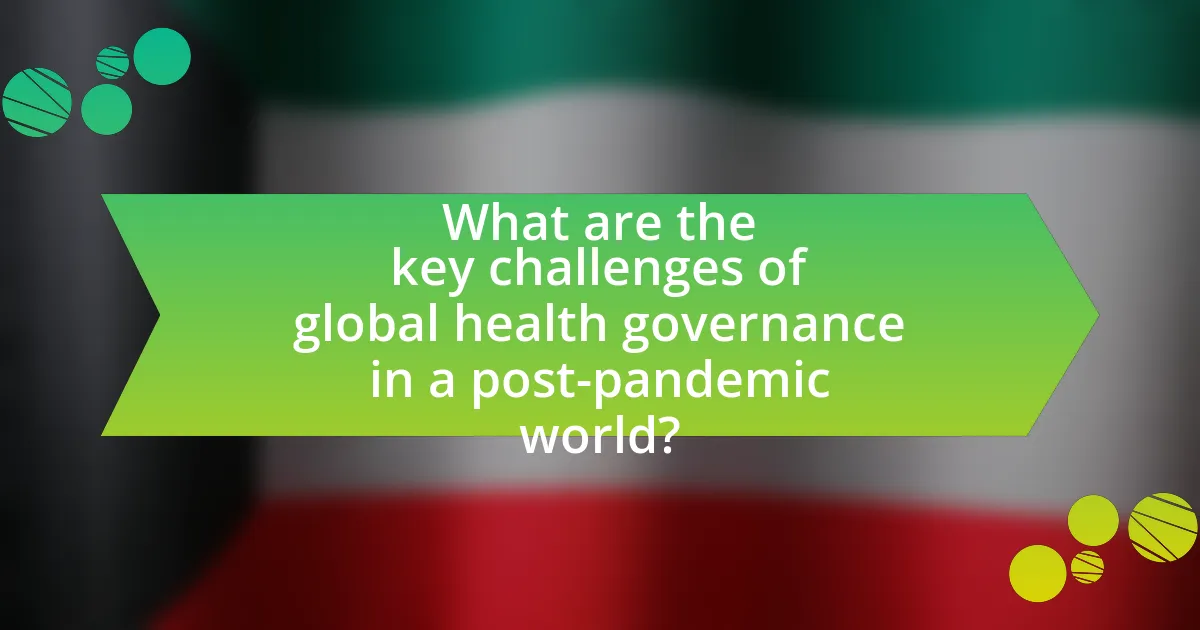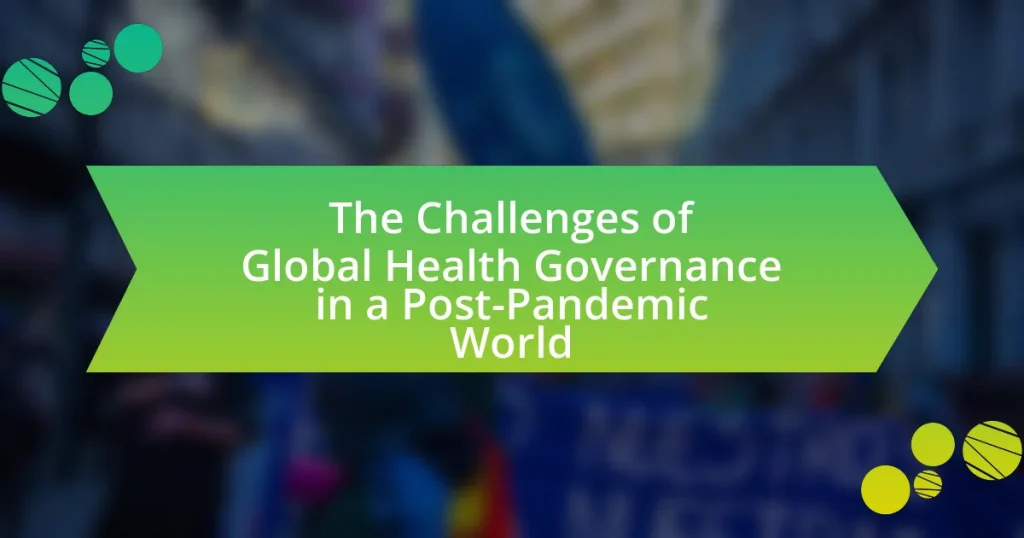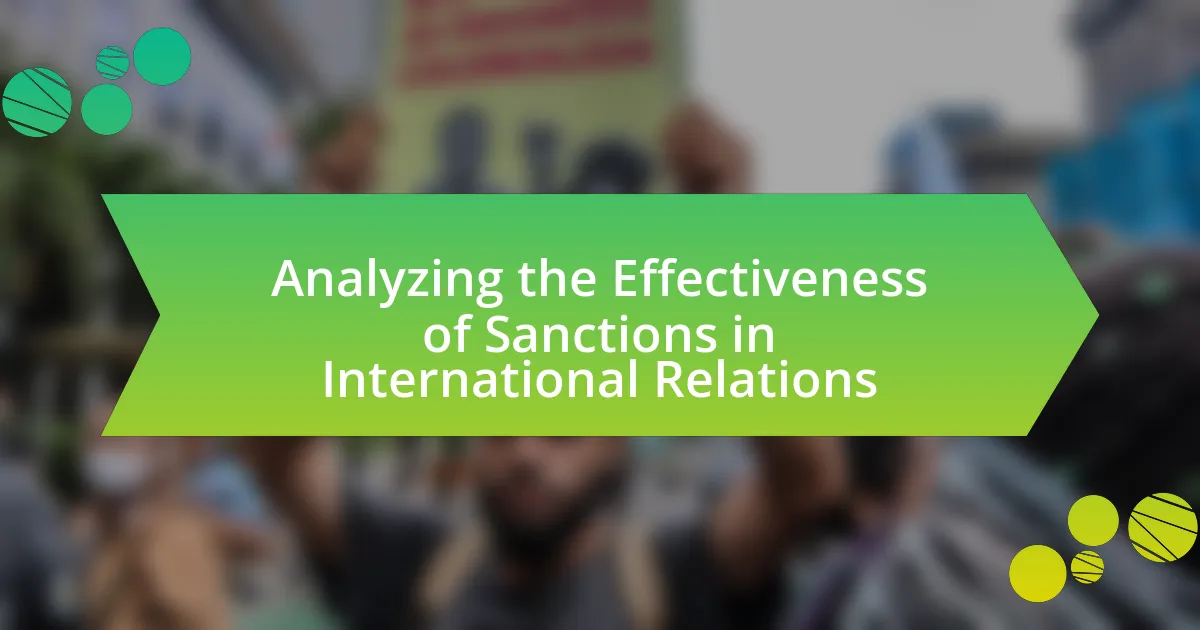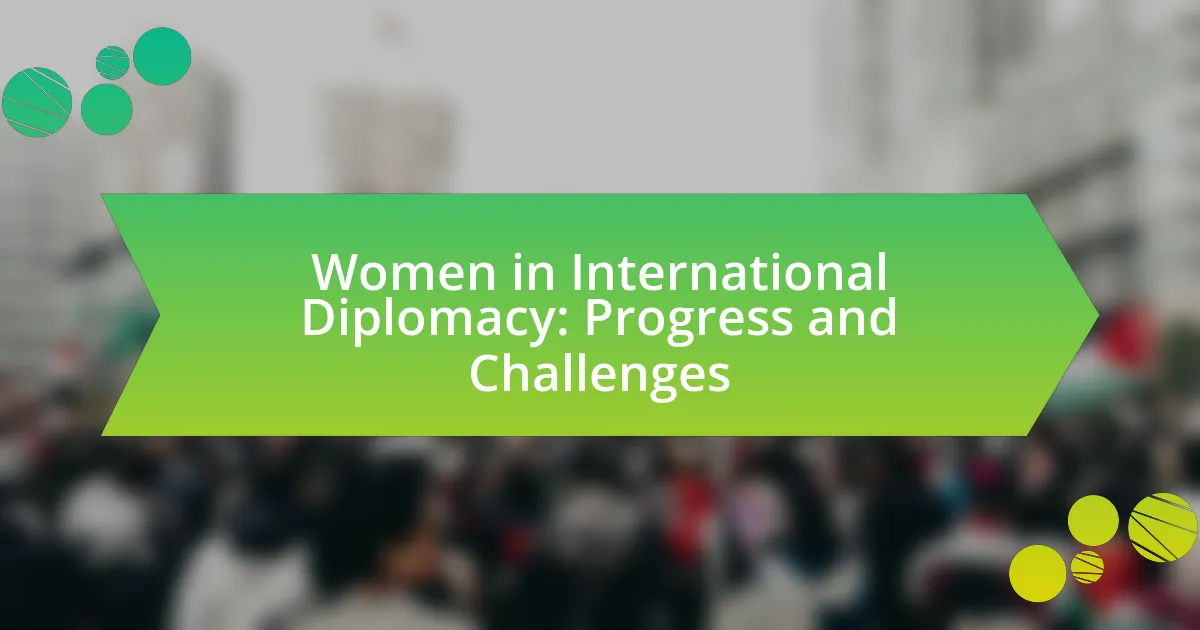The article examines the challenges of global health governance in a post-pandemic world, focusing on issues such as equitable access to vaccines, health disparities, and the need for strengthened international cooperation. It highlights how the COVID-19 pandemic has reshaped global health governance, revealing weaknesses in health systems and prompting calls for reforms, including a global health treaty. Key lessons learned emphasize the importance of robust health systems, rapid response capabilities, and the role of international organizations like the World Health Organization in shaping health policies. The article also discusses the impact of socioeconomic disparities on health outcomes and explores emerging trends, partnerships, and best practices for effective global health governance moving forward.

What are the key challenges of global health governance in a post-pandemic world?
The key challenges of global health governance in a post-pandemic world include ensuring equitable access to vaccines, addressing health disparities, and strengthening international cooperation. Equitable access to vaccines remains a significant issue, as evidenced by the disparity in vaccination rates between high-income and low-income countries; for instance, as of mid-2023, over 80% of vaccines were administered in high-income nations, while many low-income countries struggled to reach even 20%. Health disparities have been exacerbated by the pandemic, highlighting the need for targeted interventions to support vulnerable populations. Additionally, strengthening international cooperation is crucial, as the pandemic revealed weaknesses in global health systems and the need for coordinated responses to future health crises, underscored by the World Health Organization’s call for reforms to enhance global preparedness and response capabilities.
How has the COVID-19 pandemic reshaped global health governance?
The COVID-19 pandemic has significantly reshaped global health governance by highlighting the need for enhanced international cooperation and coordination in health responses. The pandemic exposed weaknesses in existing health systems and governance structures, leading to calls for reforms such as the establishment of a global health treaty to ensure better preparedness for future pandemics. For instance, the World Health Organization (WHO) has emphasized the importance of a unified global response, as evidenced by the COVAX initiative, which aimed to ensure equitable access to vaccines across countries. This shift towards collaborative frameworks marks a critical evolution in how nations approach global health challenges, underscoring the necessity for shared responsibilities and resources in managing public health crises.
What lessons have been learned from the pandemic regarding health systems?
The pandemic has highlighted the critical importance of robust health systems and the need for global collaboration in health governance. Key lessons include the necessity for rapid response capabilities, as evidenced by the swift spread of COVID-19, which overwhelmed many health systems globally. Additionally, the pandemic underscored the significance of equitable access to healthcare resources, as disparities in vaccine distribution revealed systemic inequalities. Furthermore, the reliance on data and technology for tracking and managing health crises was emphasized, demonstrating that effective health information systems are vital for timely decision-making. These lessons indicate that strengthening health systems and fostering international cooperation are essential for better preparedness for future health emergencies.
How have international collaborations evolved in response to the pandemic?
International collaborations have evolved significantly in response to the pandemic by increasing the urgency and scope of global partnerships in health research, vaccine development, and information sharing. For instance, initiatives like COVAX were established to ensure equitable access to COVID-19 vaccines across countries, demonstrating a shift towards collective action in addressing global health crises. Additionally, the World Health Organization facilitated real-time data sharing and coordinated responses among nations, highlighting a strengthened commitment to collaborative governance. This evolution reflects a recognition of the interconnectedness of health systems and the necessity for cooperative frameworks to tackle future pandemics effectively.
What role do international organizations play in global health governance?
International organizations play a critical role in global health governance by coordinating international responses to health crises, setting health standards, and facilitating collaboration among countries. For instance, the World Health Organization (WHO) leads global health initiatives, provides technical assistance, and monitors health trends, which is essential for managing pandemics and outbreaks. Additionally, organizations like the United Nations Children’s Fund (UNICEF) and the Global Fund mobilize resources and implement health programs, ensuring equitable access to healthcare services. Their involvement is supported by historical data showing that coordinated efforts, such as the response to the Ebola outbreak in West Africa, significantly improved health outcomes and containment strategies.
How do organizations like WHO influence health policies globally?
Organizations like the World Health Organization (WHO) influence health policies globally by setting international health standards, providing technical assistance, and coordinating responses to health emergencies. The WHO develops guidelines and recommendations that member states adopt, which shape national health policies and practices. For instance, the WHO’s Framework Convention on Tobacco Control has led to significant policy changes in over 180 countries, reducing tobacco use and improving public health. Additionally, during the COVID-19 pandemic, the WHO played a crucial role in coordinating global responses, sharing critical data, and advising countries on best practices, which directly impacted national health strategies and resource allocation.
What challenges do these organizations face in the post-pandemic landscape?
Organizations in the post-pandemic landscape face significant challenges, including resource allocation, public trust, and coordination among stakeholders. Resource allocation has become critical as many organizations struggle with funding cuts and increased demand for health services, leading to difficulties in maintaining operational capacity. Public trust has been eroded due to misinformation and inconsistent messaging during the pandemic, complicating efforts to engage communities effectively. Additionally, coordination among various stakeholders, including governments, NGOs, and international bodies, is hindered by differing priorities and approaches, which can lead to fragmented responses to health crises. These challenges are underscored by the World Health Organization’s findings that highlight the need for improved collaboration and transparency in global health governance to address future health threats effectively.
How do national governments impact global health governance?
National governments significantly impact global health governance by shaping policies, funding, and international cooperation frameworks. They establish health regulations and standards that influence global health initiatives, such as the World Health Organization’s guidelines. For instance, during the COVID-19 pandemic, national governments played crucial roles in vaccine distribution and public health measures, which directly affected global vaccination rates and health outcomes. Furthermore, governments contribute to global health governance through bilateral and multilateral agreements, such as the Global Health Security Agenda, which aims to enhance global preparedness for health emergencies. Their participation and commitment to these frameworks are essential for effective global health responses.
What are the responsibilities of governments in managing health crises?
Governments are responsible for coordinating public health responses during health crises. This includes implementing emergency health measures, ensuring the availability of medical resources, and disseminating accurate information to the public. For instance, during the COVID-19 pandemic, governments enacted lockdowns, facilitated vaccine distribution, and provided financial support to affected populations, demonstrating their role in crisis management. Additionally, governments must collaborate with international organizations, such as the World Health Organization, to align strategies and share data, which is crucial for effective global health governance.
How do political factors affect health governance decisions?
Political factors significantly influence health governance decisions by shaping policy priorities, resource allocation, and regulatory frameworks. For instance, government stability and political ideologies can determine the extent of public health funding and the implementation of health initiatives. In countries with strong political will, such as those that prioritized universal healthcare, there is often a direct correlation with improved health outcomes and access to services. Conversely, political instability can lead to fragmented health systems and inadequate responses to health crises, as seen during the Ebola outbreak in West Africa, where governance challenges hindered effective containment measures. Thus, the political landscape directly impacts the effectiveness and efficiency of health governance.
What are the implications of inequities in global health governance?
Inequities in global health governance lead to disparities in health outcomes, access to healthcare, and resource allocation among countries. These inequities result in poorer health indicators in low-income nations, where limited access to vaccines and treatments exacerbates disease burden, as evidenced during the COVID-19 pandemic when wealthier countries secured vaccine supplies while poorer nations struggled. Furthermore, inequities hinder collaborative efforts to address global health threats, as unequal power dynamics can stifle the voices of marginalized populations in decision-making processes, ultimately undermining the effectiveness of global health initiatives.
How do socioeconomic disparities affect health outcomes globally?
Socioeconomic disparities significantly affect health outcomes globally by creating unequal access to healthcare resources, education, and healthy living conditions. Individuals in lower socioeconomic groups often experience higher rates of chronic diseases, limited access to preventive care, and poorer overall health due to factors such as inadequate nutrition, unsafe living environments, and lack of health insurance. For instance, the World Health Organization reports that people in the lowest income quintile are more likely to suffer from conditions like diabetes and cardiovascular diseases compared to those in higher income brackets. This disparity is further exacerbated by systemic issues such as discrimination and social determinants of health, which perpetuate cycles of poverty and ill health.
What strategies can be implemented to address these inequities?
To address inequities in global health governance, strategies such as enhancing access to healthcare, promoting equitable distribution of resources, and strengthening international collaboration can be implemented. Enhancing access involves removing barriers to healthcare services, ensuring that marginalized populations receive necessary medical attention. Promoting equitable distribution of resources requires policies that allocate funding and medical supplies based on need rather than economic status, as evidenced by initiatives like the COVAX program, which aims to provide vaccines to low-income countries. Strengthening international collaboration can be achieved through partnerships between governments, NGOs, and private sectors to share knowledge and resources, as demonstrated by the Global Fund to Fight AIDS, Tuberculosis and Malaria, which has mobilized significant funding to combat these diseases in underserved regions.
How can technology enhance global health governance?
Technology can enhance global health governance by improving data collection, analysis, and dissemination, which leads to more informed decision-making. For instance, digital health platforms enable real-time tracking of disease outbreaks, allowing for timely responses and resource allocation. The World Health Organization reported that the use of mobile health applications during the COVID-19 pandemic facilitated communication and coordination among health authorities, demonstrating the effectiveness of technology in managing public health crises. Additionally, telemedicine expands access to healthcare services, particularly in underserved regions, thereby strengthening health systems globally.
What role does data sharing play in improving health responses?
Data sharing plays a critical role in improving health responses by enabling timely access to information that informs decision-making and resource allocation. When health data is shared among governments, organizations, and researchers, it facilitates a coordinated response to health crises, such as pandemics. For instance, during the COVID-19 pandemic, countries that engaged in data sharing were able to track virus spread more effectively, leading to quicker interventions and better outcomes. Studies have shown that transparent data sharing can reduce response times by up to 50%, highlighting its importance in enhancing public health strategies and outcomes.
How can telemedicine and digital health solutions bridge gaps in care?
Telemedicine and digital health solutions can bridge gaps in care by providing remote access to healthcare services, thereby overcoming geographical and logistical barriers. These technologies enable patients to consult healthcare providers from their homes, which is particularly beneficial in underserved areas where medical facilities are scarce. For instance, a study published in the Journal of Medical Internet Research found that telemedicine increased access to care for rural populations by 38%, demonstrating its effectiveness in reaching those who might otherwise go without necessary medical attention. Additionally, digital health solutions facilitate continuous monitoring and management of chronic conditions, improving patient outcomes and reducing hospital readmissions.
What are the emerging trends in global health governance post-pandemic?
Emerging trends in global health governance post-pandemic include increased collaboration among nations, a focus on equitable vaccine distribution, and enhanced surveillance systems for infectious diseases. The COVID-19 pandemic highlighted the necessity for countries to work together, leading to initiatives like the COVAX facility, which aims to ensure fair access to vaccines globally. Additionally, there is a growing emphasis on strengthening health systems and infrastructure to better respond to future health crises, as evidenced by the World Health Organization’s recommendations for member states to invest in resilient health systems. Enhanced data sharing and transparency are also becoming critical, as countries recognize the importance of timely information in managing public health threats effectively.
How is climate change influencing global health policies?
Climate change is significantly influencing global health policies by prompting governments and organizations to integrate climate-related health risks into their public health frameworks. This integration is evident in the World Health Organization’s (WHO) initiatives, which emphasize the need for health systems to adapt to climate impacts, such as increased heat-related illnesses and the spread of vector-borne diseases. For instance, the WHO’s report on climate change and health highlights that climate change could cause an additional 250,000 deaths annually between 2030 and 2050 due to malnutrition, malaria, diarrhea, and heat stress. Consequently, countries are increasingly prioritizing climate resilience in health policy, leading to the development of strategies that address both climate change mitigation and public health improvement.
What new partnerships are forming to tackle global health challenges?
New partnerships forming to tackle global health challenges include collaborations between governments, non-governmental organizations, and private sector entities aimed at improving health systems and pandemic preparedness. For instance, the Global Health Security Agenda (GHSA) has expanded its coalition to include over 70 countries and organizations, focusing on enhancing global health security through shared resources and expertise. Additionally, the Coalition for Epidemic Preparedness Innovations (CEPI) has partnered with pharmaceutical companies and research institutions to accelerate vaccine development for emerging infectious diseases, demonstrating a commitment to collaborative efforts in addressing global health threats.
What best practices can be adopted for effective global health governance?
Effective global health governance can be achieved through the adoption of best practices such as enhancing international collaboration, establishing clear communication channels, and ensuring equitable access to healthcare resources. International collaboration is crucial, as evidenced by the World Health Organization’s (WHO) role in coordinating responses to health crises like the COVID-19 pandemic, which highlighted the need for countries to work together to share information and resources. Clear communication channels, including transparent data sharing and regular updates among nations, foster trust and facilitate timely responses to emerging health threats. Additionally, ensuring equitable access to healthcare resources, as emphasized in the WHO’s Universal Health Coverage initiative, is vital for addressing disparities and improving health outcomes globally. These practices collectively strengthen the framework for effective global health governance.
How can countries collaborate more effectively in health governance?
Countries can collaborate more effectively in health governance by establishing robust international frameworks that facilitate information sharing, resource allocation, and coordinated responses to health crises. For instance, the World Health Organization (WHO) plays a crucial role in promoting global health standards and enabling countries to share data on disease outbreaks, which enhances collective preparedness and response. Additionally, countries can engage in joint research initiatives and funding mechanisms, as seen in the Coalition for Epidemic Preparedness Innovations (CEPI), which aims to accelerate the development of vaccines against emerging infectious diseases. These collaborative efforts are supported by evidence showing that coordinated actions during the COVID-19 pandemic led to faster vaccine development and distribution, demonstrating the effectiveness of international cooperation in health governance.
What frameworks can ensure sustainable health governance moving forward?
Sustainable health governance moving forward can be ensured through frameworks such as the World Health Organization’s Health Systems Framework, the One Health Approach, and the Global Health Security Agenda. The World Health Organization’s Health Systems Framework emphasizes the importance of strengthening health systems to improve access, quality, and efficiency in healthcare delivery, which is crucial for resilience against future health crises. The One Health Approach integrates human, animal, and environmental health, recognizing the interconnectedness of these domains and promoting collaborative efforts to address health threats. The Global Health Security Agenda focuses on enhancing countries’ capacities to prevent, detect, and respond to infectious disease threats, thereby fostering international cooperation and preparedness. These frameworks collectively provide a structured approach to address the complexities of global health governance in a post-pandemic world.






